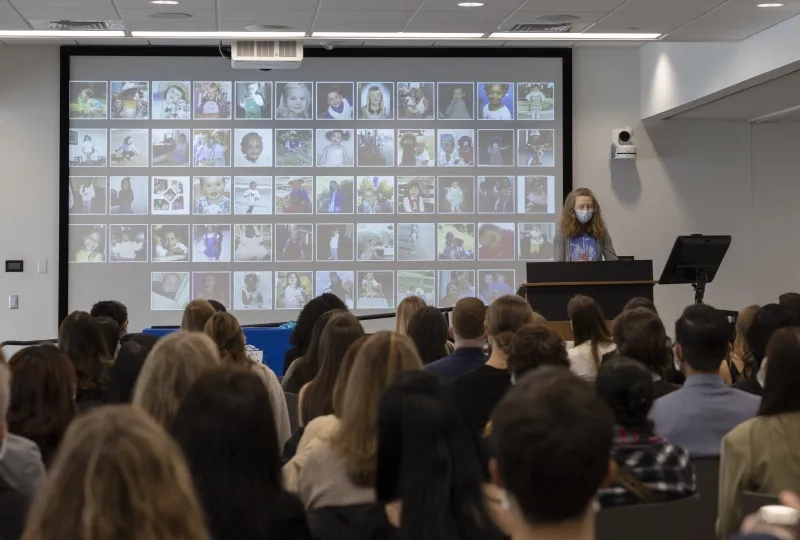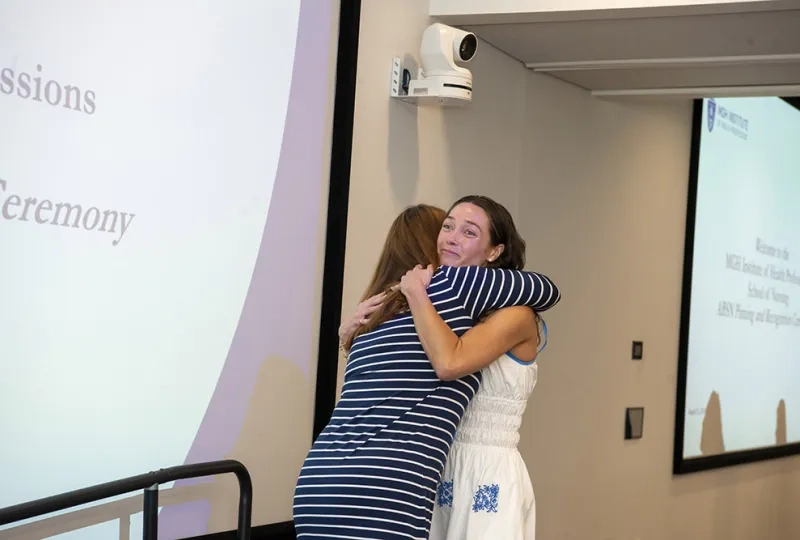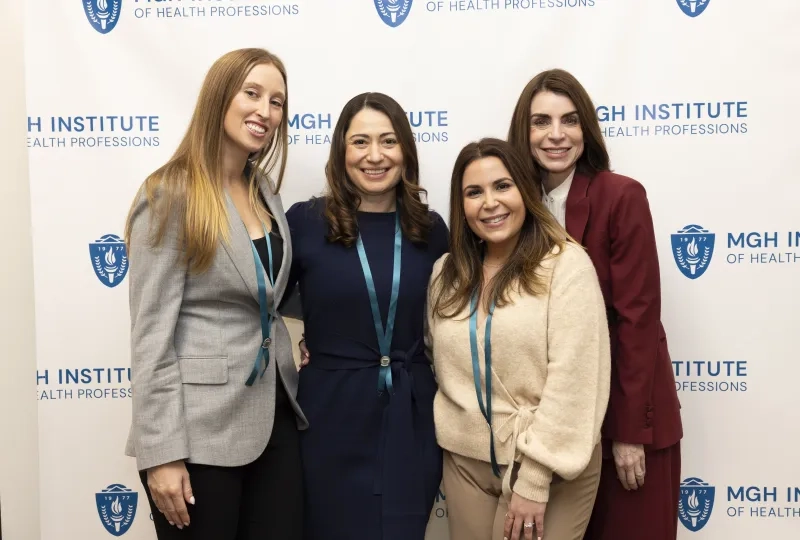
3 MGH Institute ABSN Grads Who Are Making a Difference

One is the site director for the Neurological Clinical Research Institute at Massachusetts General Hospital. Another is a Daisy award winner in line to become a nurse leader at MGH while another just got elected to her community’s school board. Alumni from the Accelerated Bachelor of Science in Nursing (ABSN) program at MGH Institute of Health Professions are making their mark in the nursing world and credit the clinical placements and faculty expertise for helping them do so. Here are their stories:
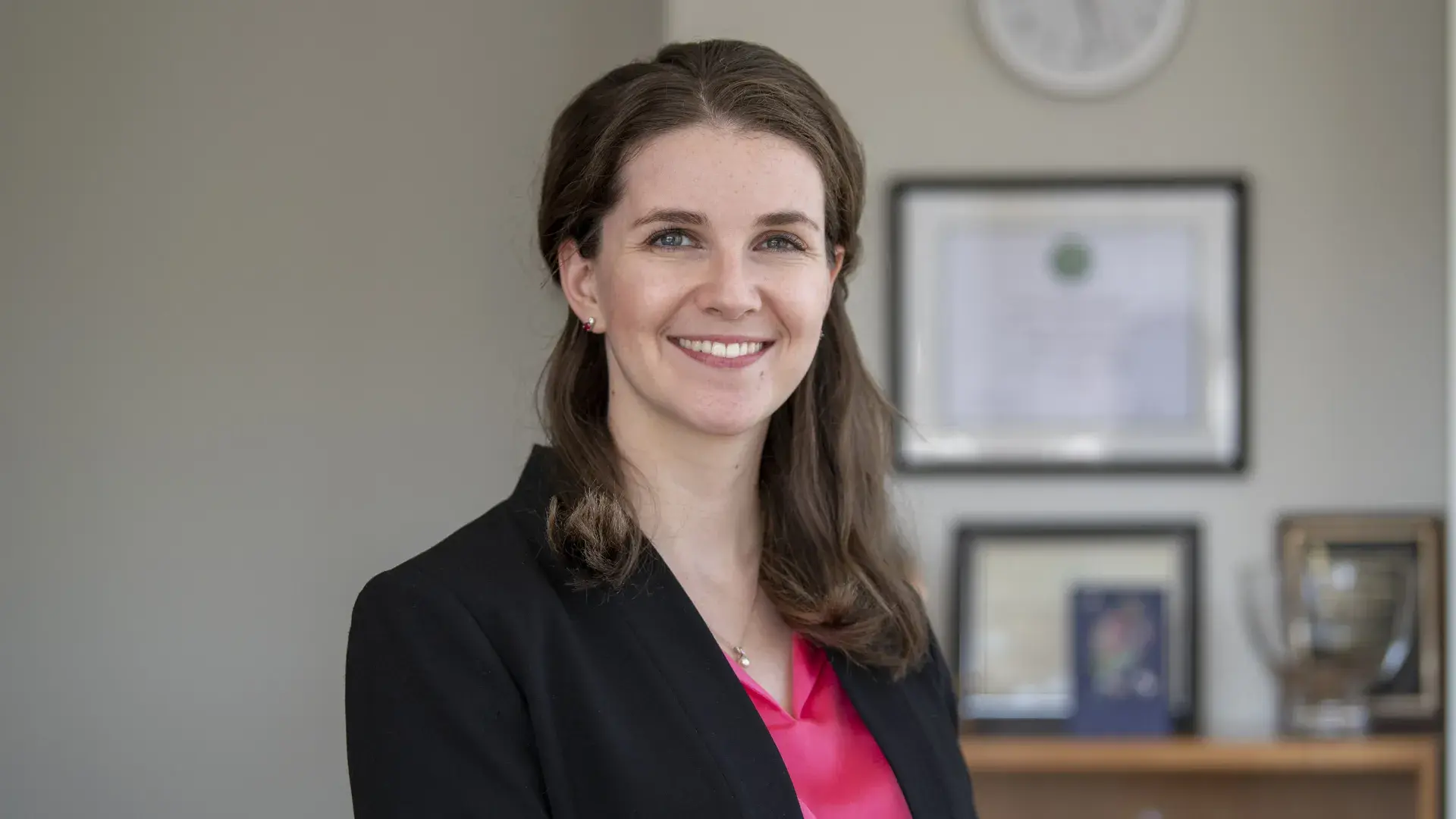
Sarah Luppino
Site Director, Neurological Clinical Research Institute
ALS Clinic Nurse Practitioner
Massachusetts General Hospital
Sarah Luppino works with patients who have been diagnosed Amyotrophic Lateral Sclerosis (ALS), which is a complex and terminal neuromuscular disease with no cure. But that’s not stopping her and her team from trying to find one.
As Site Director for the Neurological Clinical Research Institute and Healey & AMG Center for ALS Research at Mass General Hospital, one of the largest ALS clinic and research centers in the world, Luppino works with neurologists and a multidisciplinary research team to discover novel treatments and therapies for people with ALS.
“We have a number of innovative and complex clinical trials,” said Luppino, who earned her ABSN degree from the MGH Institute in 2014. “We see close to 1,000 patients a year. And our research has really exploded since I started. We have approximately 10 active interventional trials right now alone being conducted at our site. And we see hundreds of patients in our research center every year.”
Luppino is also a Nurse Practitioner at the hospital’s ALS Multidisciplinary Clinic, a clinic she says is largely nursing-run.
”Taking care of someone with ALS requires intensive assessment and symptom management, critical thinking, and palliative care, and nurses are really the heart of our clinic as point people for patients and their families,” said Luppino, who has made sure clinic nurses are consistently involved in research and leadership roles. “I've been able to be part of incredible initiatives where we can advocate for Nurse Practitioners to step in as leaders at the investigator level and run clinical trials. That means helping to design protocols, consenting patients to research trials, prescribing and overseeing their investigational therapy, supporting them in their disease management, and performing procedures.”
Luppino works with a multi-disciplinary team of research nurses, nurse practitioners, neurologists, physical therapists, speech language pathologists and more than 30 research coordinators and interns who help run the trials with industry and academic collaborators. As site director, she oversees the hiring, project structuring and workload allocation.
“My role requires a lot of program management and adaptive planning to meet the needs of the patients and research landscape,” she said. “I also act as an investigator on a number of the trials, consenting of patients to research studies and overseeing their treatment. And then I also see patients in the multidisciplinary clinic. I wear many hats in my role with lots of tasks to juggle, but I love it. The MGH Institute prepared me well as a Nurse Leader and critical thinker.”
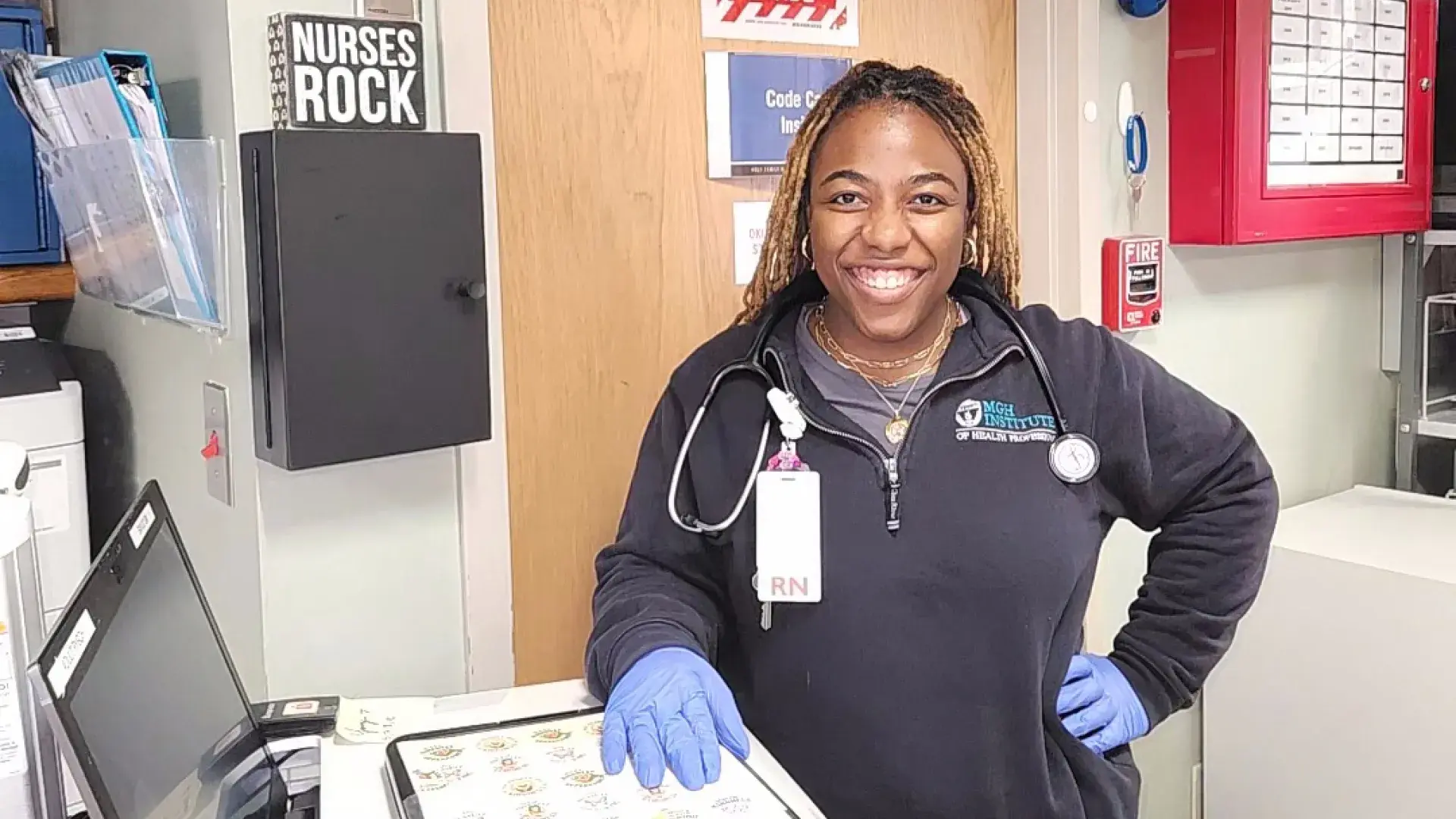
Yonnie Collins
Staff Nurse, Holy Family Hospital
A 2019 graduate of the MGH Institute’s ABSN program, Yonnie Collins loves her nursing job at Holy Family Hospital in Haverhill, so much so that when she doesn’t feel her patients received all they needed during a shift, she’ll stay for an extra hour or two.
“I try to spend quality time with patients and try to connect with them on something, such as music,” said Collins. “I want to make sure I build that rapport with them, even for a couple of minutes where I do a silly dance, or we talk about food or something.”
Collins cherishes certain moments of her profession, such as seeing a very sick patient who turned the corner, or being able to explain to someone why they need to be in the hospital.
“The highs are definitely educating patients and having them understand their disease process more,” said Collins. “My favorite part is when someone finally understands why they're in the hospital, or why certain things are happening to them. That’s when they feel empowered to make decisions about their health that benefits them the most.”
A recent highlight for Collins came outside the hospital, when she was elected to the Haverhill School Committee, a position she was drawn to after seeing too many inequities based on where children attended school.
"I see trauma that occurs where I'm dealing with students in the emergency department, but then they still have to get discharged and go to school the next day,” said Collins. “The students are going home with these new medications and new services, but is anyone thinking about how that will affect their school day? I think it's really important for someone to advocate and have the experience advocating, and then also to have that healthcare perspective, especially around mental health. Our students need the extra support, so it's good to have someone who has experience in that area advocating on their behalf.”
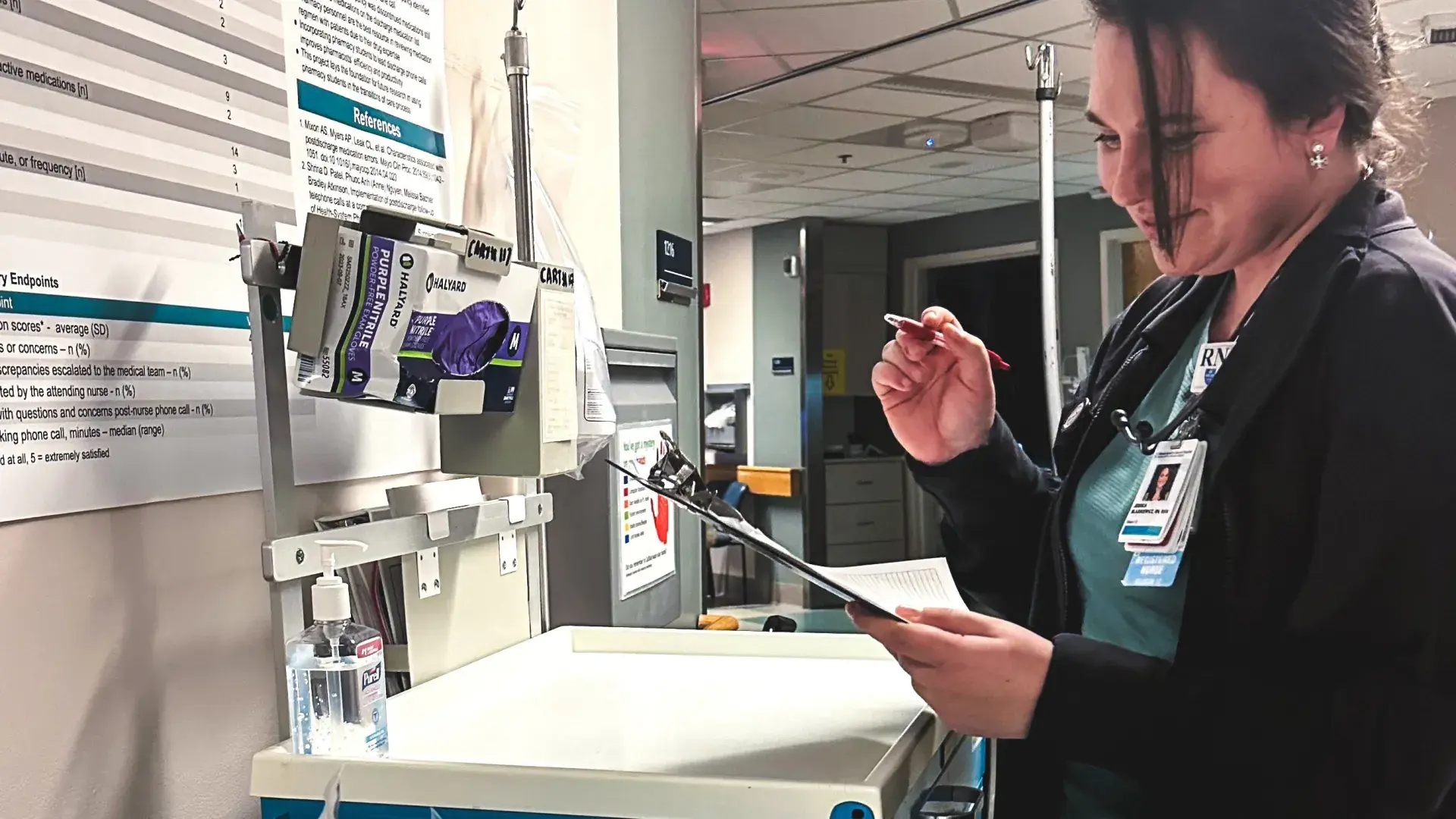
Jessica Blasikiewicz
Staff Nurse, Massachusetts General Hospital
Jessica Blasikiewicz never saw herself as a leader, yet that’s what she’s become at Massachusetts General Hospital. A 2020 graduate of the MGH Institute’s ABSN program, Blasikiewicz – a staff nurse and preceptor – soon will be a charge nurse.
“A charge nurse is the one who knows the policies and has a pretty wide skill set already and knowledge base,” said Blasikiewicz, “and they're basically the ones that watch over the unit and make sure everything's running appropriately and policies are being followed. If any staff nurse, unit coordinator, or nursing assistants have any questions, they can go to the charge nurse.”
Blasikiewicz approaches her job with confidence because of her IHP education which has led to a rapid rise within the nursing ranks. After only a year, she was asked to train travelling nurses, and that responsibility grew to her training more experienced nurses, and now she trains new graduate who are working on getting hired permanently at MGH.
“The new grads are definitely more fun because you get to mold them into what we need as MGH nurses,” said Blasikiewicz, who used to see herself as wallflower but now embraces being a leader. “When you have new grads that say, ‘Thank you so much for helping me with this,’ it just really strikes you differently. I do know what I'm doing. And wow! I'm doing this right.”
To solidify that, Blasikiewicz won the Daisy Award, nursing’s highest honor, for the selfless care she gave to one of her patients. The award is another log fueling the fire that she has arrived.
“You finally feel like you know what you're doing, and you're in the right spot, and how it took so long to get there,” said Blasikiewicz. “But you're finally happy and content about it. You also understand that it's okay to say that you don't know something which is also a big part of nursing because you’re learning every day. It’s never the same thing.”
Related Articles
